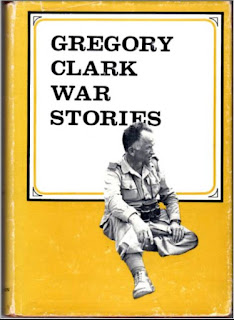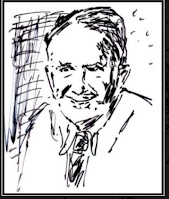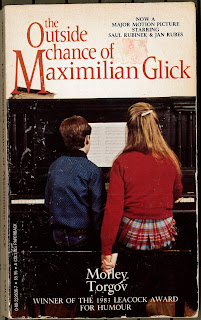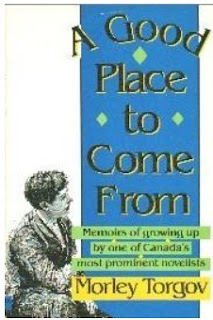Mariposa Podcast
1965 Leacock Medal Winner
War Stories by Gregory Clark
Born in Toronto in 1892 (died 1977), Gregory Clark worked for the Toronto Star for close to forty years and later became a national personality and one of Canada’s best known writers as a columnist for the Weekend magazine.
This podcast features an interview
with Greg Clark’s great nephew – Tom Clark, the well
known broadcaster and
journalist – whose 45 year career in television also took him to war zones
around the world .
Dick Bourgeois-Doyle (DBD)
You're obviously well placed to talk
about Gregory Clark, not only as a family member, but as somebody who's echoed
his career in a lot of ways.
I guess the obvious question is ‘Did
you know him well?’
Tom Clark
Yeah, I got to know Greg really well,
not so much as a child because I knew him as sort of the old uncle and so on.
But when I really got to know him was when I got into journalism. Even as a
very junior reporter, Greg took a real interest in what I was doing - wasn't so
keen on the fact that I was going into television. And he always thought that
that would come and go and was probably right. But nevertheless, when he moved
into the King Edward Hotel in downtown Toronto, he had a small suite there
where he lived, and every Thursday, I would go and have lunch with him at the
hotel, and we would usually start off in his suite and sit around and tell a
few stories.
And then we'd go downstairs, and we'd
have lunch, and then I go back to work.
I'll tell you one thing that he did
when he was at the King Edward Hotel.
The first lunch. So I looked at my
watch, we were up in his room, and I said “Well, look, you know, it's now 12:15,
we ought to get down for lunch”. And he said, okay, and he stood up sprightly.
He was in good shape. I went to open the door, and he said, “Hang on a sec.” He
said, “You're not doing this, right”. So he goes into a closet and he finds a
wheelchair. I said, ”What are you doing with a wheelchair?” And he said, “Look
and learn.”
So we get to the elevator, he sits in
the wheelchair, he says now push me into the elevator, we went down to the main
floor. And if you went from the elevator directly to the dining room, you just
go literally across the lobby. So I started heading that way. And he said, “No.
We're going to go all around the lobby.” So I pushed him all around the lobby.
And then I discovered why. Because about every three feet, somebody would stop
us and say, “Oh, Mr. Clark” - not me but
Greg – “so nice to see you.” And he say,
“Well, very nice to see you too.” But by the time we got to the dining room, he
had spoken to about 15 different people. And he said at my age, he said, “that's
how you keep things going”. I never, never forgot that. He was not only a great
writer, and a great raconteur, but he was a great showman as well. He understood
the importance of living the part that he had given to himself.
DBD
He was described in quite a bit of the
material I read as a great personality. So I think that story kind of hints at
that.
Tom Clark
Well, he had a bet with the staff at
the King Eddie that if there was thunder and lightning between the hours of 9pm
and midnight, they would bring him a small bottle of scotch. And every morning when he went down, he looked at
the staff and he’d say, “Did you hear that storm last night? I think it hit
about 10 o'clock.”
DBD
So you guys, the two of you come from
quite a long line of journalists. I think his grandfather was an early editor,
the Star and your dad founded Canada's Newswire?
Tom Clark
Yeah. Yeah, there's a sort of lineage, such as it is: that was Greg's father, and my grandfather's father. So Greg and my grandfather were brothers. Their father was J.T. Clark, who started the modern Toronto Star with Joe Atkinson. And so they sort of grew up as the sons of a an esteemed newspaperman in Toronto although J.T. at that point was not a reporter on the street. He was the Managing Editor of the Toronto Star, and they learned a lot from him.
And so it wasn't surprising that after the First World War, both of them
went into journalism full time. My grandfather worked for the Globe and Mail
for a period of time, Uncle Greg worked for the Toronto Star. And then my
grandfather got out and ended up in advertising and then did a whole bunch of
other things after that. Greg as you
know, stayed in it right through to being a war correspondent in World War Two,
and then went on with his partner artist Jimmie Frise to write the back page of
the Weekend Magazine for years and years and years. So they and I, I guess,
come by it honestly.
DBD
Did this context help you presume a
career in journalism or did you just come at it on your own?
Tom Clark
I got into journalism because around
our dining room table, it wasn't anything foreign or mysterious. It was
something that everybody in the family at one time or another was involved with
including an aunt of both Greg and my grandfather's who was the first female
editor of the Clinton Examiner newspaper. So I mean, it ran in various
forms in the family. What I'm saying is that when I said to my mother and father
“I think I'm going to pursue a career in journalism,” there was nothing unusual
about that. So whereas I think for a lot of people going into it, it's a little
bit scary. For me, it was a completely known country; I already had the
guidebook.
DBD
The thing that intrigues me most about
Greg Clark is how he retained that ability to see the humour and the lighter side of life, especially after
coming out of the experiences of the First World War and then other tragedies
that visited him over his life. He just had some kind of ability to
compartmentalize or something. Does that resonate with you? From what you've
already said, it sounds like his humour was genuine.
Tom Clark
It was – but Greg was a very complicated man, I think as most humorists are. And I think you're right to use the expression that he “compartmentalized” his humour because Greg was deeply affected by both wars. He had, you know, triumph and tragedy in both conflicts and a couple of his stories are deeply, deeply moving, without any trace of humour at all. And that really spoke to what affected his entire life. I mean, there in the second war itself, he managed to go visit his son on the frontlines. I've got a photograph of him where he brought his son Murray, a lemon pie, which was Murray’s favorite dish, and Greg had to get special dispensation as a war correspondent to go visit his son. And the very next day, his son was killed by a phosphorus grenade. That made an enormous impression on him.
Yet, at the same time, in the invasion of Sicily, my grandfather, Greg's brother, at that time was the head of information for the Canadian Armed Forces. And as the Canadians moved up through Sicily and into Italy, Greg got in touch with his brother, Joe, and said, “We've got to meet up.” So Greg goes down into this little town in Italy, where he finds his brother, my grandfather, who in his early years before the war - after the First World War, and before the Second World War - was actually courted by the MET in New York to come and join them as a member of their opera company. He was a brilliant singer, great opera singer. And so Greg took them up to the balcony of this small little Italian town. And of course, the townspeople who just were liberated and I think they were all pretty drunk. And Joe turned to Greg who said, “Here is your MET moment.” And my grandfather sang the Nessun dorma, which would have been a magnificent thing to see.
But this is
all Greg; he set this up. And again, no humour in it, but he found the
profundity in a lot of things. And I think that the humour saved him from going
back to a lot of the memories and a lot of the things that had affected him as
a young man,
DBD
His Leacock winning book is War
Stories. It's a collection of
stories from the war, some from Italy. I believe there is no mention of his
son's death that might have happened outside of the collection, but I found a
pattern there - he would tell a very poignant story from the war, something
very moving, but then there would be like a funny twist at the end. Or he would
tell a funny story - one that I remember, in this regard was - he was a great
fly fisherman, right?
Tom Clark
Yeah.
DBD
And in the war, and he stumbled upon
this place in England with some friends, which was an iconic site for fly
fishermen, and he told about the day and at the end, they ate the fish. And
then – in just like one sentence at the end, you realize they're heading off to
Normandy the next morning. It was that kind of technique, and you're
somebody who's probably told thousands of stories in the process of your
career. Does that ring true with you as an approach?
Tom Clark
Yeah, you know, it does, and I've sort of melded a little bit of Greg’s style into mine. You know, we're dealing with a completely different age. In Greg's day, of course, it was all newspapers, some radio. In my age, it was virtually all television and some newspapers. But you know, Greg always told me that especially as a war correspondent, and one of the most famous war correspondents that this country had in World War Two, that he left the main story up to the reporters who would hang out at military headquarters and write all the this happened that happened, they went there, they did this. And Greg said “I always wanted to do the secondary story because that's where the truth lay.”
And so he’d do things like during the battle you mentioned, you know, his fly fishing, well he took his fly rod with him through the battlefields of Italy and France and Belgium. And very often during the battle, he’d just go down to a stream and start fishing. And he also had his binoculars, but they weren't there to spot the enemy. They were there to watch birds because he loved bird watching. And inevitably, he told me, what he tried to do is at least in the second paragraph put in something either about fishing or about a bird that he had just seen as almost as a subclause in a sentence. He said the reason he did it, he said, was to send secret code back to birdwatchers in Canada to say, “Don't worry, everything's gonna be okay.” You know, he invented this code himself, but he lived by it.
And so in my own work, I've been to a
number of wars, and I agreed with him that story always was the second story,
not the first story. The first story is
all about officials and generals and, you know, big policy; the real story lies
with that little nugget that you find somewhere, that little bit of humanity that
you can go in and examine and look at, and that will tell you more about the
war more about the situation than anything you're going to hear at military
headquarters. I've done both, and I never found military headquarters to be
particularly satisfying as a journalist. So in that sense, yeah, I sort of
followed what Greg had decided was the best way to cover a war.
DBD
Well, you answered a number of my
questions in that response because I was wondering if there was a technique
that kind of echoed on - and other things you said sort of reinforce that
notion that Greg Clark is worthy of study as some of the professionals have
hinted. My ambition is just to celebrate people like him. It's stunning, how
quickly people forget them.
Tom Clark
These were the people Richler and Berton, and Greg, among others, who really sort of defined the modern story of Canada; they sort of told us who we were, in many respects, and you know, that always changes, I get that, and we morph into other things, and so on. But at least we had that in that era, people who were telling us who we were as a country and as a people. But we were talking about the complications of Greg and war, and the fact that he always tried to find humour somewhere in there, part of the secret code, he said, that he was sending back to people.
One story that he wrote, though, really stuck with me.
And that was one of his worst stories where he described in a sense, having
almost a hallucination. He was there for the dedication of the Vimy memorial in
1936, or something like that. And he had trouble sleeping, because of course he
had fought Vimy Ridge and the memorial, the memorial is there, obviously. And
he describes how he gets up in the middle of the night because he can't sleep
and he walks down to the old battlefields along the hill, and all of a sudden,
he starts seeing these bivouacs, these little fires with men sitting around.
And he thought at first they were there as part of the celebration that was
going to happen the next morning. And then he looked at them and all the people
sitting around the fires have little bunches of flowers that they were holding
up to various parts of their body. And he started talking to them. And it
became clear to him, as he wrote in the story, that he was talking to the
ghosts of Vimy Ridge. And the flowers were being held over the parts of their
body that had been hit by enemy fire and had killed them. And they were fascinated
to talk to Greg, these ghosts. And they chatted about all sorts of things. And
then they said, “You know, our sacrifice must have made this world a wonderful
place. Tell us, Greg, just how wonderful the world is now.” And Greg said that he
lost it and had to go back to the hotel. I mean, it was a very poignant story.
You know, the end of the story is where he said I didn't have the heart to tell
them what had happened after their deaths. I think that got closer to the
reality of where he lived through those experiences.
Now, the war didn't define him entirely. I mean, he wrote acres and acres of stories on just human life, boating, cottages and he was always respectful of people high up in authority, but never took them seriously. In any story he wrote about somebody in a position of great power, there was always an element somewhere in that story about how slightly ridiculous the person was, and in a gentle way, his humour was always gentle. It was never confrontational, and it was never harsh. But you couldn't read those stories without knowing exactly who Greg was and what his view of the world was and about his view of power. And he was everyman in a way. And he was not high and mighty, he didn't have a lot of money. He knew the rich and famous, but he wasn't rich. And he never thought he was as famous as all those other people that he was talking to. So that was reflected in his writing as well. And I think that's what endeared him to so many people.
He was he was
your uncle. I mean, he was the guy who loved sitting by the side of a lake and
contemplating on something and it was always gentle humour about what was
happening on the lake. We've lost that. I don't know of anybody out there. Now,
who does that type of gentle humour? It's a shame. I think, you know, hopefully
it'll come back. But Greg was the ultimate practitioner of it. There's so many,
many stories. I know that Greg and I talked about stuff of his that I read; I
think John Carroll in his book, The Life and Times of Greg Clark sort of
summed up a lot of this. And Jock really got it quite well.
I'll tell you one last little bit
about Greg, which I think is instructive. I was at lunch with him one day, and
he leaned back and he said, “Now he said we have got five more of these
lunches. And then we're done.” I said, “What
are you talking about?” And he said,” Well, I am narrowing my circle of people
that I interact with.”
And I said, “Okay, and I'm a victim of
that.” And he said, “Everybody is going to become a victim of that, because I
intend to die in about a year from now. And as I progress towards that moment,
I'm just going to start reducing the number of people who I interact with, so
that when I go, I've already said goodbye to everybody.” And he said, “Don't
worry, you've got another couple of months to go.”
Well, sure enough, he died almost to
the day that he said he was gonna die a year out. He planned it. Now. Greg, you
know, I say planned it, I didn't know maybe that was part of the performance of
Greg Clark, who always dressed the part, he always wore the little porkpie hat.
He didn't wear a coat. He wore a cape. You know, he did all these things. So
this was his ultimate demise: planned as he said it was or was it just a good
guess? I don't know. But in the end, it was the perfect exit for Greg Clark.



